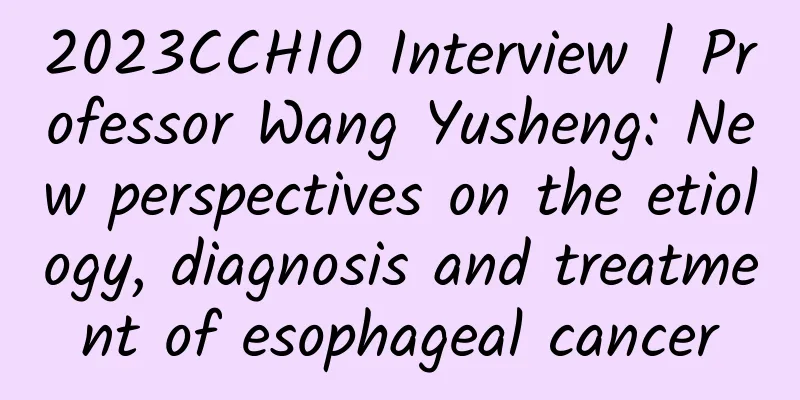2023CCHIO Interview | Professor Wang Yusheng: New perspectives on the etiology, diagnosis and treatment of esophageal cancer

|
Recently, Professor Wang Yusheng from Shanxi Cancer Hospital shared his views on the diagnosis, treatment and pathogenesis of esophageal cancer. Professor Wang not only revealed the basic pathogenesis of esophageal cancer, but also shared the latest diagnosis and treatment methods, as well as management suggestions for adverse reactions. Professor Wang Yusheng Master Supervisor Postdoctoral Supervisor Deputy Director and Chief Physician of the Department of Gastroenterology, Shanxi Cancer Hospital Doctor of Oncology Vice Chairman of the Ethics Committee of Shanxi Cancer Hospital Deputy Director of Shanxi Gastric Cancer Diagnosis and Treatment Center Member of the Gastric Cancer Quality Control Expert Committee of the National Cancer Quality Control Center Standing Committee Member of Oncology Committee of Chinese Association of Research Hospitals Standing Committee Member of the Esophageal Cancer Committee of Beijing Cancer Prevention and Treatment Society Member of the Standing Committee of CACA Integrated Oncology and Kidney Disease Committee Member of the Standing Committee and Deputy Secretary-General of CACA Esophageal Tumor Integrated Rehabilitation Committee Member of CACA Tumor and Hepatology Committee, Tumor MDT Committee, and Tumor Information Management Committee Member of the Liver Oncology Branch and Colorectal Disease Branch of the Chinese Medical Promotion Association Member of the Digestive Tumor Committee of Beijing Cancer Prevention and Treatment Research Association Chairman of the Tumor Heterogeneity and Individualized Treatment Committee of Shanxi Anti-Cancer Association Vice Chairman of the Tumor Clinical Trial Committee of Shanxi Anti-Cancer Association Vice Chairman of the Gastrointestinal Stromal Tumor Committee of the Shanxi Geriatrics Society He has published 15 SCI articles, presided over 12 provincial and ministerial projects, and served as PI for 73 clinical studies in sub-centers. Understanding the pathogenesis of esophageal cancer will help formulate treatment plans and monitor and evaluate the disease Professor Wang Yusheng first emphasized the importance of understanding the etiology of esophageal cancer for prevention and treatment. Professor Wang pointed out that the pathogenesis of esophageal cancer is diverse and is the result of environmental-genetic-gene interactions. In addition to genetic factors and regional characteristics, gene mutations, RNA interference, DNA damage repair, tumor microenvironment, dietary habits, chronic adverse stimulation, and inflammatory responses are all involved in the occurrence and development of esophageal cancer. However, there is no unified and definite conclusion yet. At present, the research on the pathogenesis of esophageal cancer focuses on eating habits, such as liking to eat hot and pickled food, and the influence of lifestyle habits, such as frequent smoking and drinking, high stress, irregular meals, etc. There are also regional water and soil issues, family clustering of tumors, etc., which all lead to the high incidence of esophageal cancer. Understanding the pathogenesis of esophageal cancer can help doctors better understand the development process and causes of the disease, so as to develop more effective prevention and treatment plans; in addition, the pathogenesis of esophageal cancer can also help doctors predict patients' responses to certain treatment plans and prognosis, so as to better choose treatment plans suitable for patients; the pathogenesis of esophageal cancer can also help doctors monitor and evaluate patients' conditions. Comprehensive examination and assessment can help understand the patient's overall condition and formulate appropriate treatment plans In terms of diagnosis, Professor Wang Yusheng suggested that the patient's medical history and symptoms should be understood first. In particular, patients with symptoms such as dysphagia, chest pain, nausea, and vomiting should be given high attention. In addition to routine physical examinations, imaging examinations such as X-ray barium meal angiography, CT, and MRI are also essential diagnostic methods. These examinations can help doctors understand the location, size, depth of infiltration, and whether there is lymph node metastasis of the tumor. Talking about the treatment of esophageal cancer, Professor Wang Yusheng said that surgery is the preferred treatment method. For patients with early esophageal cancer, surgical resection of the tumor can achieve a good survival rate. However, for patients with locally advanced disease, surgical treatment alone has limited effect, so it is necessary to combine comprehensive treatment methods such as radiotherapy, chemotherapy, and immunotherapy. Professor Wang Yusheng also emphasized the important role of immunotherapy in the treatment of esophageal cancer. In recent years, clinical trials of immune checkpoint inhibitors for the treatment of esophageal cancer have been continuously carried out and have achieved remarkable results. Immunity combined with synchronous radiotherapy and chemotherapy synergistically enhances the effect. Many clinical studies have shown that combined treatment has significant efficacy, pathological complete remission has improved to a certain extent, and long-term survival benefits are expected to be further improved. For immune-related adverse reactions, doctors will promptly handle them according to the reaction classification. However, immunotherapy is not without adverse reactions. Professor Wang Yusheng pointed out that immune drugs may cause immune-related adverse reactions, such as rash, pneumonia, and adverse gastrointestinal reactions. Clinically, it is recommended that patients communicate with their doctors in a timely manner and take appropriate measures according to the grade of the reaction. Generally, grade 1 immune-related adverse reactions do not require immediate drug discontinuation, but require corresponding symptomatic treatment. Grade 2 generally requires drug discontinuation and treatment with cortisol. Severe adverse reactions such as myocarditis can also be life-threatening. It is recommended to fully understand the drug before immunotherapy, and to detect and treat it in a timely manner. Finally, Professor Wang Yusheng called on the public to remain vigilant about esophageal cancer and to look at new treatments rationally. He said that although new methods such as immunotherapy have brought new hope, each patient's situation is different and the treatment plan should be tailored to the individual. Professor Wang expressed the hope that through the continuous accumulation of scientific research and clinical practice, more accurate and effective diagnosis and treatment plans can be provided for esophageal cancer patients. |
<<: What happens to those who often squeeze pimples?
Recommend
What is considered normal menstruation?
For a woman, the normality of menstruation is a b...
Twelve days after medical abortion, the blood is still thick
After choosing medical abortion, menstruation wil...
How is your breathing?
Hey! Hello, everyone~ First of all, let us warmly...
The dangers of squatting during menstruation
We all know that doing some exercise or maintenan...
Will girls age faster if they donate blood?
The decision to donate blood should be based on y...
It's not difficult to have an oval face. Just eat these 7 "de-swelling" foods every day.
Nowadays, slim and curvy figures are popular, and...
March is the golden period for eye protection: please keep this "no-cost" eye protection strategy! (with a practical checklist)
“Working on winter vacation homework until the ea...
Rumors and truth about leftover food: It can cause cancer and anemia
Can we eat leftover food? I believe that if this ...
The harm of feeding and milk-raising to babies
If the mother's breast milk is not enough, th...
Is it good for girls to take a shower every day?
Nowadays, people's living standards are const...
Why is Zhacai bitter? Detailed introduction to Zhacai knowledge
As the variety and types of convenient foods beco...
World Ovarian Cancer Day: You know nothing about women's eggs
The ovary is an important organ in the female bod...
How to brew lotus root starch? How to remedy the problem of lotus root starch being diluted
Lotus root starch is a convenient food made from ...
How fast do babies grow in their first year? Does sleep help babies grow and develop?
Author: Liu Li, Chief Physician, National Childre...
What should you pay attention to when resting after medical abortion?
Medical abortion is a type of abortion surgery an...






![[Medical Q&A] Does hemangioma require treatment?](/upload/images/67f0e83a65bcf.webp)


